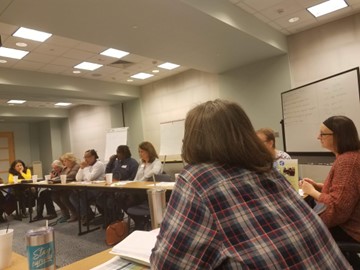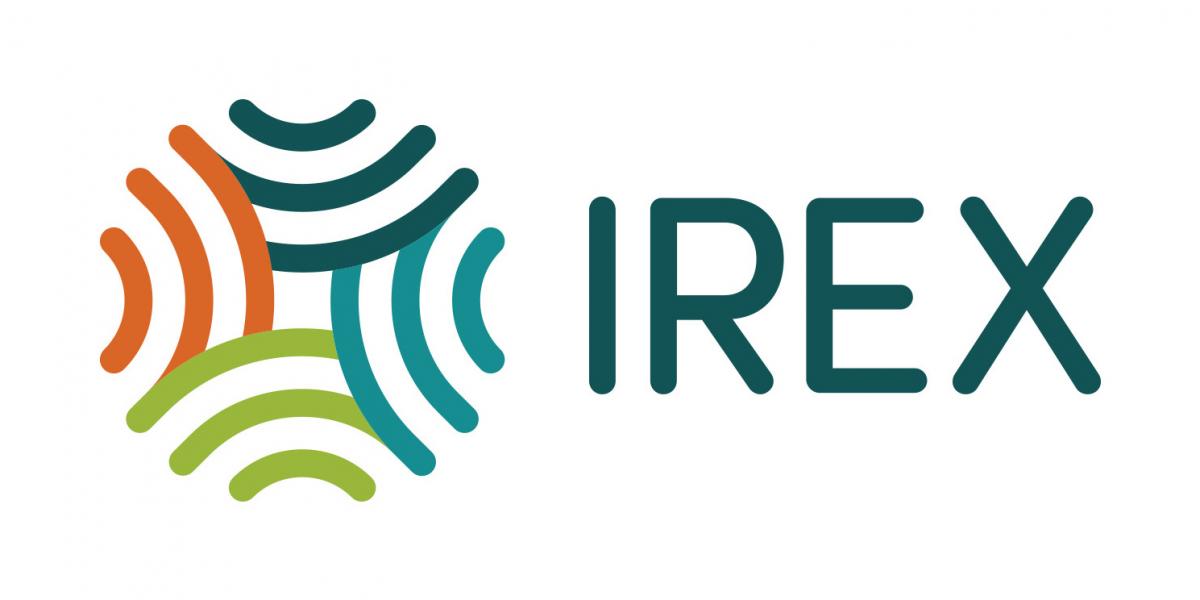Bridgebuilding Case Study: Topeka & Shawnee County Public Library
This case study was developed by IREX as an example of a "bridgebuilding" activity. IREX defines bridgebuilding as engaging across differences in ways that respect identities, foster mutual relationships, seek a common good, and promote a commitment to civic engagement, thereby contributing to increased social capital and strengthened civic infrastructure, and ultimately, a stronger democracy.
Background/context of the library
The Topeka & Shawnee County Public Library (TSCPL) is serving the entirety of Shawnee County through its single library location. Their mission is to spark creativity and connect their community through literacy and learning. They have the following values which drive their mission:
- Excellence: The library creates experiences that anticipate the community’s diverse needs and exceed expectations.
- Curiosity: The library is hungry to learn, create and innovate, and the library inspires the community to do the same.
- Literacy: The library helps people make their lives better by providing the tools to successfully navigate the world.
- Freedom: The library welcomes everyone in the community and supports and defends the right of their customers to access information without judgment.
- Teamwork: The library builds stronger communities through mutual trust, collaboration, and shared goals.
- Accountability: The library serves the needs of the entire community by using resources responsibly, fairly, and transparently.
What bridging initiatives/programs has the library offered?
The library has had a long-term partnership with the League of Women Voters to host monthly educational presentations dubbed Tuesday Topics during which local experts present on an issue of interest to the community. During the pandemic, the library helped the League of Women Voters to start holding the Tuesday Topics via Zoom. The sessions were recorded and posted to the library’s website and YouTube channel. The library also supported the creation and posting of articles about the League of Women Voters, to help increase their reach.
Since the pandemic, the library has focused on making these sessions more accessible to people who might be interested by offering sessions in a hybrid format and sharing the links publicly on the library website without requiring people to register to get access. The presentations have focused on a variety of topics, including racism as a public health crisis and resettlement schools for indigenous people. One presentation included the Shawnee County Election Commissioner discussing voting processes in Shawnee County and answering questions. The partnership with the League of Women Voters has helped the library to involve prominent local experts whom they would not otherwise have had access to and to build connections for future programming.
The library also started organizing public deliberation sessions using materials from the Kettering Foundation and the National Issues Forums Institute. Rather than taking a stand on any particular issue, the library’s goal for these events was to help the community learn to have deliberative conversations through practice sessions on different topics. Since 2019, they have used a number of issue guides for these conversations, including ones focused on poverty, mental illness, and safety and justice. During the pandemic these deliberations shifted to Zoom but staff observed that they were not as effective virtually as they were in person. The library has also encouraged its staff—including those at the leadership and management levels—to participate in these events so that they can learn to talk and think deliberatively when making decisions related to the library.

During the pandemic, the library developed its own issue guide, which was called "Reframing Topeka: How Do We Improve Topeka?" The issue guide, which the library developed through focus groups, describes current issues and proposed changes for Topeka, along with potential tradeoffs, including how to make Topeka safer, more successful economically, fairer, and more fun. They led multiple deliberations using this issue guide during and just after the pandemic and continually asked community members to help them improve it, which was an effective way of soliciting people’s input and prompting them to really deliberate. Recently, the library helped students at a local university to participate in a deliberation using this guide, and the students are now using their proposed changes from the deliberation for class projects. The library also purchased conversation cards that people can use to spark deeper conversations with people they know, with the idea that this will be less intimidating to people than speaking to strangers during a formal event and will help them feel empowered to have harder conversations on their own. The library plans to use these cards as circulating kits that community members can check out.
In addition to their public deliberation work, the library promotes civic engagement in collaboration with the Shawnee County Election Office. They have a strong working relationship with the Election Office, which values the library’s ability to make civic engagement materials and activities interesting and compelling. The library helps with voter registration on a continuous basis and is listed on the Election Office’s website as an official voter registration location. Ahead of every election and primary, the Election Office sets up a table in the library’s rotunda for three days to help community members register to vote and confirm their registration status. Additionally, the library creates flyers and bookmarks with key electoral information and gets them approved and co-branded by the Election Office to share with the community. The library also worked with the Election Office to graphically highlight key dates from the local election calendar on bookmarks, signs and flyers, and add steps citizens should take, including adding a step focused on following up, to see what their elected officials are doing after the election.
Why were bridging initiatives needed in the community?
During a community health rankings1 meeting in 2017, the County Health Officer shared that the social determinants of health are predictive of 80% of health outcomes. The library and many other members of the community saw this as a call to action and believed they could play a role in helping the community address this challenge. This resulted in the community creating a health equity working group, which the library led with the Health Department and the Community Health Coalition. The library collaborated with the working group to start holding public deliberation sessions. The goal of these deliberations was to help people understand how different other people’s experiences are from their own, and that what’s important to them is based on their values and experiences, and is not wrong, just different.
What were the signs of success?
During a deliberation on safety and justice in 2019, at least 12 people participated, including people who were current or retired corrections officers, an on-duty police officer, employees from racial justice groups, and library patrons such as a grandmother worried about her mixed-race granddaughter. The discussion was difficult and very emotional at times, but library staff defused tension as much as they could by asking people to slow down so they could take notes. The library sees this deliberation as both their greatest success and failure because during the reflection portion at the end of this session, people were emphatic that they had not reached any common ground, yet individuals did show subtle signs of newly understanding others’ different experiences.
Despite this lack of common ground, the deliberation was powerful and successful in being able to get a group of people from such different backgrounds to come to the library to spend time and effort to think deeply on a topic, even knowing the library would not be able to implement any solutions. The library also hopes that participants will remember each other’s stories and think about them when they see related issues in the news, or their own lives, in the future. They see every person who comes to a deliberation who starts to think differently about how they approach these conversations and how they listen to other people as a win.
The library has also observed that, during reflections at the end of deliberations, people often say things like, “I can’t stop thinking about… ,” “I had never considered that,” or “I don’t think that can be true! I’m going to go learn about that.” In one deliberation on mental illness, a participating police officer sought feedback and evaluation from the other participants by presenting an idea that was being considered by the department.
What was learned?
The library has observed that the deliberation sessions with the greatest attendance are ones where people are sent by their employers to make sure their organization’s voice was in the room. For that dynamic to work well, facilitators have had to gently push these people to show up as just human rather than an institutional representative, whenever possible. It is very difficult to get an organic group of people with the time to participate, and a deep interest in these topics, to come to the library for deliberations, since so many people do not have the capacity to do so.
The library has also had challenges encouraging people from various sides of a particular issue to attend events, given that some of the library’s partners are perceived as being aligned with particular groups or political parties. To address this, they believe it would be helpful to build additional connections with other groups who can help them reach people with different perspectives and persuade them to attend.
Advice to other libraries: The library recommends focusing on understanding what is going on locally, rather than on big national challenges. It is helpful to develop an understanding of how your community measures success and improvement, whether it is through a community health improvement plan or an economic development plan, so that the library can support the findings of trusted professionals without taking a particular position or having a political opinion. The library also recommends getting to know people in the community who are working on making some type of system or policy change, finding out who their partners are, and learning about their concerns and what they would like other people to know
To engage adults more generally, they changed their approach to better meet people where they were. For example, they had an anime and manga club that met in the afternoon at the library, but didn’t have a lot of traction, so they moved it outside of the library at later hours and saw that people were interested and participation increased. They also saw great success after moving a book club to a local, downtown bar and hosting it at night. Making these changes helped the library realize that people were interested in the programs, but their hours were not conducive to having diverse participation because adults are either at work or have busy schedules.
[1]For more information, see https://www.countyhealthrankings.org/
Photo: Provided by Topeka & Shawnee County Public Library
Library details
- Library name: Topeka & Shawnee Public Library
- City, State: Topeka, KS
- Size of library system: 1 location
- Contact for bridging work: Lissa Staley, [email protected]
Use this case study to learn:
- about different approaches for promoting civic engagement in your community.
- how you can facilitate conversations between members of the community to foster dialogue across differences.
- tips for finding the right partners for activity outreach.
- how libraries are partnering with national and local organizations on bridging initiatives.
- how to identify the right issues to organize discussions on.
Share your story

Does your library have a bridgebuilding example to share? Write your own case study by completing this template and sending it to [email protected].

